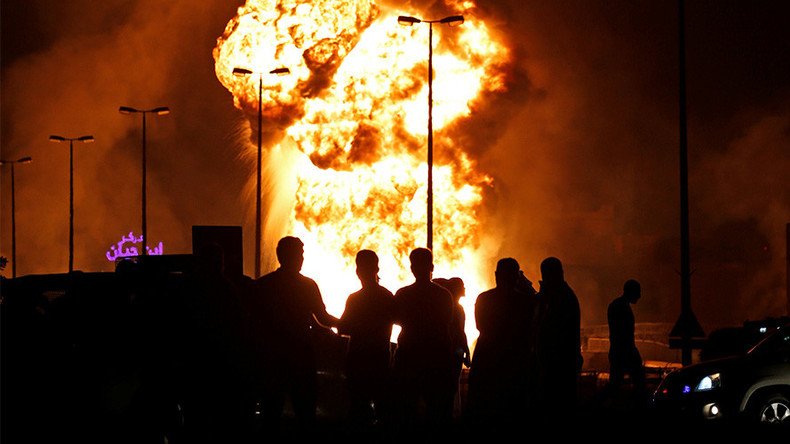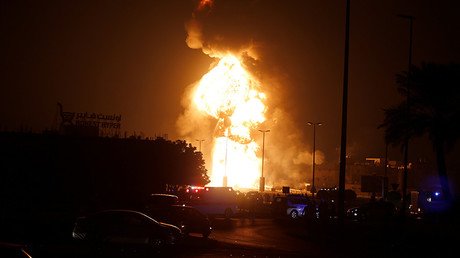The Kingdom of Bahrain has claimed that Friday’s explosion on the only pipeline that supplies oil from Saudi Arabia was somehow linked to Iran, opening a new chapter of hostilities between Tehran and the Sunni Gulf states.
“The incident was an act of sabotage and a dangerous act of terrorism aimed at harming the higher interests of the nation and the safety of the people,” read a statement from Bahrain’s interior ministry. “Terrorist acts witnessed by the country in the recent period are carried out through direct contacts and instructions from Iran,” the statement claimed.
While Bahrain often blames Iran for backing an insurgency that has plagued the country after authorities suppressed the so-called Arab Spring protests in 2011, Tehran has repeatedly denied any involvement. It also says that it is not behind the latest incident.
Bahrain said it had extinguished the fire that raged overnight near Buri, a village outside the capital Manama. It said residents have been evacuated and the oil supply shut off. The 230,000 barrels per day pipeline is the main hydrocarbon route into the island state which produces only a fraction of the oil that it consumes. A second pipeline is scheduled to come online next year.
Saudi Arabia said it has stopped pumping oil through the fractured 55-km line, and bolstered security at its own pumps and refineries.
“The attack on the pipeline was followed by the suspension of the pumping of oil to the State of Bahrain,” the Saudi Ministry of Energy, Industry and Mineral Resources said in a statement. “The ministry also confirmed it has increased its security presence at all its facilities, and that all these facilities enjoy the highest levels of protection and safety.”
Bahrain, which has a majority Shiite population but ruled by a Sunni royal family, has been rocked by internal discontent for several years, responding with a combination of repression and reform. But it has also seemingly become a new proxy in the region-wide crisis that has already drawn in Yemen, Qatar, and most recently, Lebanon.
Regional tensions escalated this week after Lebanon's Prime Minister Saad Hariri suddenly announced his resignation from an undisclosed location in Saudi Arabia, accusing Iran and its Lebanese ally, Hezbollah, of a "desire to destroy the Arab world."
Hezbollah and Riyadh subsequently accused each other of inciting war in the region. The Saudi Minister of State for Gulf Affairs, Thamer al-Sabhan, claimed "Lebanon is kidnapped by the militias of Hezbollah and behind it, is Iran." Hassan Nasrallah, Hezbollah’s leader, quickly countered, saying, the gulf monarchy had declared war on Lebanon for its "unprecedented intervention" in Lebanon's internal affairs through the "detention" of al-Hariri.
In Yemen, the Saudi-led coalition has been waging a military campaign against Shiite Houthi rebels, accusing Iran of supplying weapons to the insurgents. The kingdom accused Houthis of firing an Iran-made ballistic missile at the Saudi capital Riyadh earlier this week, and responded with bombing raids on the Yemeni capital, Sana’a. Tehran denies the allegation, but concedes it backs the rebels’ cause.
Syria is another area of contention, where Iranian forces are supporting the Syrian Army, while the Saudis are backing armed opposition groups.


